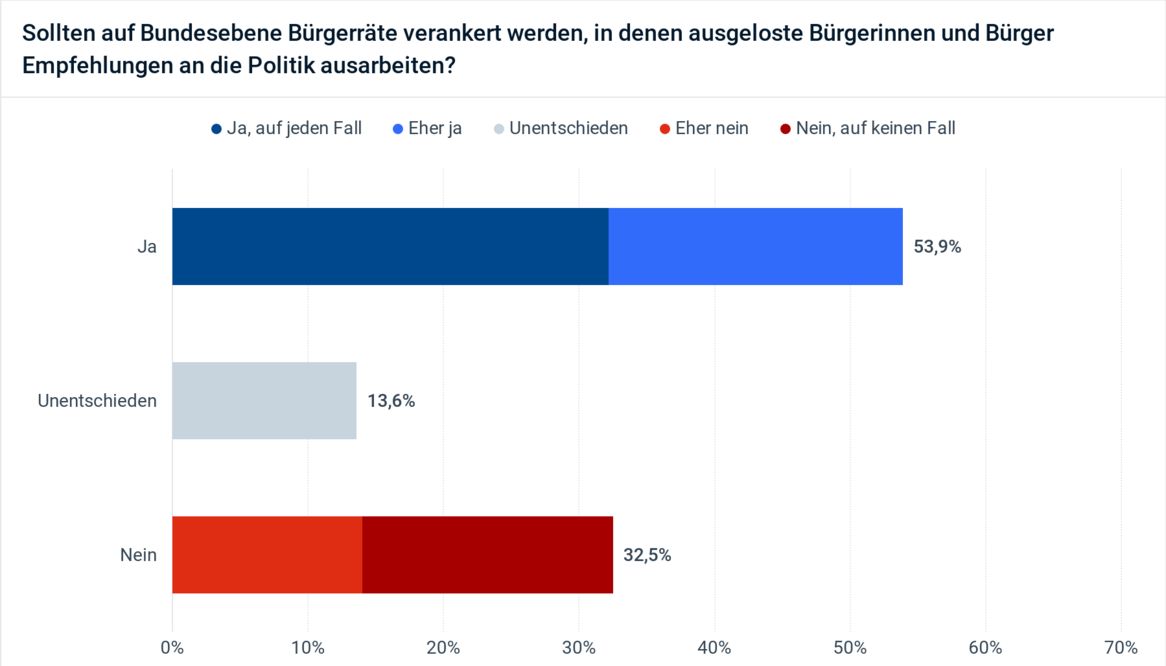Poll: Majority in favour of citizens' assemblies

According to a recent survey, 53.9 percent of all Germans are in favour of randomly selected citizens' assemblies at the federal level. There is also broad support for anchoring sortition in federal politics in all 299 constituencies of the Bundestag.
In 240 out of 299 constituencies, even more than 50 percent of respondents are in favour of having randomly selected citizens draw up policy proposals at the federal level. The most support for citizens' assemblies is found in Chemnitz (65.2 per cent). In the other 49 constituencies there is at least a simple majority. The narrowest majority is in Berlin Charlottenburg-Wilmersdorf, where only 43.8 per cent support the establishment of citizens' assemblies and 40.7 per cent are against.
For nationwide referendums, in which not only proposals would be made but a binding vote would be taken, there is also a majority in almost all constituencies (297 out of 299). Nationwide, 65.1 per cent are in favour. Having citizens' assemblies prepare referendums is considered a good idea by 46.5 per cent of respondents. The survey was conducted by the Civey Institute on behalf of Mehr Demokratie.
Three nationwide citizens' assemblies so far
Three citizens' assemblies have already taken place at the federal level in recent years. The assemblies on democracy, Germany's role in the world and climate change took place on the initiative of civil society organisations. They were financed by foundation funds and donations.
Participation experts from the Institute for Advanced Sustainability Studies (IASS) Potsdam and the Institute for Democracy and Participation Research (IDPF) at the University of Wuppertal concluded in an evaluation of the citizens' assembly on "Germany's Role in the World" held at the beginning of 2021 that citizens' assemblies are a suitable procedure for the cooperative and constructive participation of citizens at the federal level. The administration of the Bundestag came to the same conclusion in its own evaluation.
Experiences in other states
In other states, people have already had experience with national citizens' assemblies. Such assemblies were held particularly frequently in Ireland, where randomly selected citizens were able to discuss issues such as abortion, same-sex marriage, electoral law, climate change and gender equality. Citizens' assemblies have also been held in Australia, Denmark, Finland, France, the UK and Canada. Hundreds of processes have already taken place at regional and local levels.
In a study on the practice of democracy by sortition published in 2020, the Organisation for Economic Co-operation and Development (OECD) recommends the use of citizens' assemblies to resolve socio-political disputes. Convening a reflection of society over several days for the purpose of learning, deliberating and developing joint competent recommendations is an effective means of overcoming polarisation and reaching consensus on the thorniest policy problems, it argues. This is especially true for issues that involve values, require compromise and involve long-term concerns that go beyond short-term thinking in electoral terms. Citizens' assemblies could help governments make difficult decisions with greater legitimacy.
Good information through citizens' assemblies
There are also already examples of combining citizens' assemblies and referendums. In the US state of Oregon, for example, from 2008 - 2016 a citizens' assembly called the Citizens Initiative Review (CIR) formulated information on referendums, which take place regularly here as well as in 23 other states. The CIR drafted a statement listing the most important facts and the main reasons for approving and rejecting the respective issue. This statement was included in the voting booklet that was sent to all eligible voters in Oregon along with other voting materials. Similar experiments have since been conducted in Switzerland. In both countries, scientific studies prove the positive effect of this citizens' assembly form on the information level of the voters.
The Monitoring Committee of the Congress of Local and Regional Authorities of the Council of Europe recommended to the municipalities of its member states in February 2021 to combine citizens' assemblies with municipal referendums in this way. Citizens' assemblies are intended to give voters access to quality information in order to make an informed decision. Already in 2019, the Citizens' Assembly on Democracy had floated the idea of thinking citizens' assemblies and direct democracy together.
The survey, together with the diverse practice of deliberative democracy, forms a good basis for anchoring nationwide citizens' assemblies in Germany.
More Information: Survey: Citizens' Assemblies on federal level in Germany (PDF)